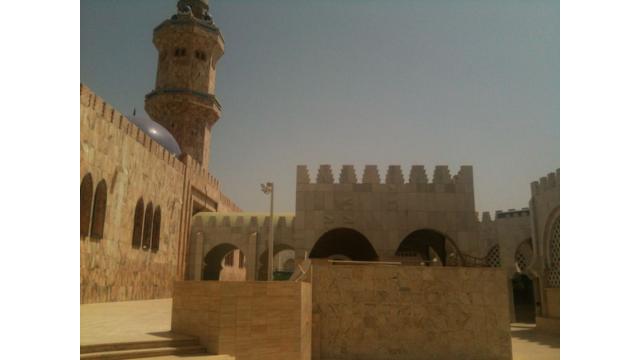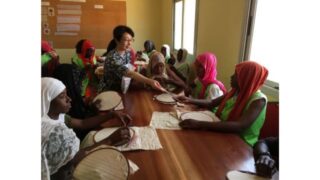The proposal is criticized by non-Mouride Senegalese but has a clear political significance as the country prepares for the 2024 presidential elections.
by Massimo Introvigne


International media have covered with curiosity the proposal by Senegal’s Mourides that their holy city of Touba should be granted an independent status “like the Vatican.” Touba has already a special status and in the city gambling, selling alcohol an cigarettes, and even wrestling and the soccer games so popular elsewhere in Senegal are prohibited. The Mourides’ leaders, however, want independence as a sovereign, Vatican-like state.
In Senegal, the proposal has been criticized by noting that other large Sufi brotherhoods would be entitled to ask the same status for their holy cities. Unrealistic as it may appear, the Mouride request has, however, a political significance. It calls for an acknowledgement of the centrality of the Mourides in Senegal’s political life while the country prepares for the difficult 2024 presidential elections.
The Sufi brotherhood system is particularly developed in Senegal, where a large part of the Muslim population belongs to three brotherhoods, two imported—the Qâdiriyya and the Tijâniyya—and one born in Senegal, the Murîdiyya (from murîd, “disciple”). The latter brings together about one-third of the Senegalese, mainly of Wolof ethnicity.
At the origins of the Murîdiyya is the preaching of Ahmadou Bamba Mbacké (1853–1927), called “Serign Touba” by his disciples, after the name of the town he founded, Touba. Bamba, raised in a family affiliated with the Qâdiriyya, lived in a period of crisis marked by the end of the independent Wolof kingdoms and the final victory in Senegal of French colonialism. His preaching became a point of reference for contradictory aspirations, marked by forms of popular discontent that in part pre-dated the French occupation.


The French, who feared the possible transformation of the brotherhood into a pro-independence movement, exiled Bamba twice. Finally, however, they acknowledged that his teachings had no political content, and in the last years of his life even decorated him with the Legion of Honor.
It is also important not to read Bamba’s success as simply a reaction to external, political factors. His family tradition, the context of Sufism in the region, and Bamba’s actual innovations with respect to the Sufi context are just as, if not more, important than his relations with colonialism.
After Bamba’s death, the leadership of the confraternity remained in the hands of the Mbacké family, direct descendants of the founder—whose first successors, and first “Caliphs-General” of the Mourides, were Mouhamadou Moustapha Mbacké (1885–1945) and Muhammad Fadilou Mbacké (1886–1968). An important role in the Mouride hierarchy was also assumed by Bamba’s collaborators, the “great talibés,” including the shaykh Ibra Fall (1858–1930), founder of the Bay Fall movement. Wrongly considered by some to be a separate branch of Mouridism, the Bay Fall constitutes both its “hard core” and a kind of security service, whose members are both acknowledged for their great dedication to the Mouride cause and sometimes criticized for a certain harshness.


With Senegalese emigration—in which Wolof street vendors, in significant part Mouride, play an important role— Mouridism became a widespread movement throughout the world, from the United States to Japan and Italy.
Beginning in the 1970s, under the leadership of Abdoul Ahad Mbacké (1914–1989), the Murîdiyya, in the words of Italian scholar Adriana Piga’s “radically changed its face.” Abdoul strengthened the large library at Touba, where a University of Islamic Studies won general respect, and gave the brotherhood “a far more orthodox religious dimension,” so that “the Mouride order, long accused of heterodoxy and fanaticism, undoubtedly succeeded in its aim of providing itself with an increasingly orthodox if not outright puritan face.” This line has been continued by successive Caliphs-General Abdou Khadre Mbacké (1914–1990), Saliou Mbacké (1915–2007), Mouhamadou Lamine Mbacké (1925–2010), Sidy Mokhtar Mbacké (1924–2018), and Mountakha Bassirou Mbacké, in office since 2018.
The distinctiveness of Mouridism consists in the “sanctification” of work, which plays an equally, if not more important, role than meditation and prayer. Through this spirituality of work, Bamba inserted an authentically African element into Sufism, and at the same time exposed himself to criticism and reservations especially from Tijânî circles. Underlying Mouridism, as with any other Sufi tarîqa, is a kind of initiatory covenant, the bai’a, by which the disciple (talibé) entrusts himself to the marabout, mediator between man and God and guarantor both of the disciple’s salvation and, at least to some extent, of his material well-being. Through the bai’a, the disciple promises to the marabout khidma (“service”), that is, work done for the benefit of both the brotherhood and the person of the marabout, who in turn takes on the task of prayer for the disciple’s benefit.


It is through the khidma and the contractual relationship with the marabout sanctioned by the bai’a that the disciple realizes irada (“commitment to walk toward God”). Mouridism also has among its pillars the offering (hadîya) and the annual pilgrimage (ziyâra) to Touba, at the founder’s tomb, presided over by the brotherhood’s Caliph-General.
The system of tâlib offerings and work for the benefit of the marabouts has given rise to what Irish political scientist Donal Brian Cruise O’Brien (1941–2012) has called “the myth of exploitation.” It rests on the stereotype of the marabout driving a luxurious car and enriching himself by exploiting his disciples. The image is certainly excessive, although it also indicates a real risk of abuse. However, as noted by Italian scholar Ottavia Schmidt di Friedberg (1957–2002), the relationship has at least some degree of true reciprocity. The marabout engages in assisting the talibé and his family in a plurality of ways, including the search for work, often with considerable success, at the same time positioning himself as a “pole of cultural reference and identification.”


These relationships dominate the entire life of the talibé and penetrate economic activities. In Senegal, from stores to cabs and buses the name Touba and the portrait of the Caliph-General or one of his predecessors immediately identify thousands of economic enterprises as belonging to a Mouride owner.
Nor is politics excluded: after his election in 2000, Abdoulaye Wade proclaimed himself “the first talibé president,” gathering support among a section of the Mourides but also reservations from those who feared electoral manipulation of the religion. These controversies culminated in the painful 2012 presidential elections, in which Wade went to the runoff, and lost, with another candidate from a Mouride family, former Prime Minister Macky Sall. Unlike Wade, Sall tried to distance himself from the mobilization of fraternity membership for electoral purposes, a characteristic feature of the Senegalese political landscape.
As President, Sall has however sought the mediation of the Mouride Caliph-General on delicate political issues. While Sall has announced that it will not seek a third presidential term in 2024, the Mourides’ requests about Touba are a warning that no Senegalese President may govern the country without a continuous dialogue with their brotherhood and the Caliph-General.








